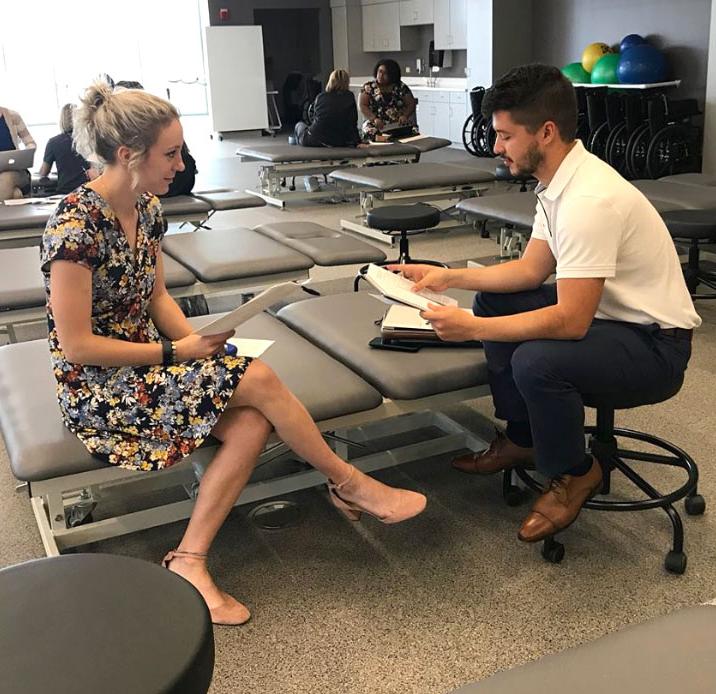技术标准
入学和留用技术标准
The Master of 医师助理 Science Program at 英国威廉希尔中文网站 is a complex and intensive course of study. It places specific demands on 学生 that closely resemble the physical and intellectual challenges graduates of the program will encounter as a practicing physician assistant (PA). The program has been designed to prepare 学生 to enter the profession with the ability, 知识, and skills necessary to perform successfully all of the essential functions expected of entry-level physician assistants. Students are to familiarize themselves with these essential functions and their associated technical standards and determine whether or not they are able to perform the specified tasks.

In accordance with applicable state and federal laws regarding people who have disabilities and our program's philosophy, 我们承诺提供合理的便利. In the event that a student determines he or she cannot meet a technical standard due to a disability, 无论是入学时还是之后的任何时候, it is the responsibility of the student to notify the Chair of the Department of 医师助理 Science and the Office of 残疾人服务 and to request a 原因able accommodation. 合理的迁就是一种策略, 由学生和学校商定, 什么能使学生达到技术标准. 教师和学生将共同努力, 在商定的战略范围内, to provide the student with the opportunity to meet the technical standard. The presence of a disability will not exempt 学生 from completing required tasks and a 原因able accommodation will not guarantee that a student will be successful in meeting the requirements of any one course. Should a student be unable to meet a technical standard or course requirement after a 原因able accommodation has been made, 录取通知书或在该课程中的身份将被撤销.
技术标准领域包括:
- 情绪/行为技能
- 认知能力
- 沟通技巧
- 观察的技巧
- 身心健康
- 精神运动技能
学生必须能够满足以下技术标准:
-
情感和行为技能 -运用社交和专业技能进行演示
- 欣赏和尊重个人, 社会, 以及同学之间的文化差异, 专业的同事, 病人, 和照顾者.
- 欣赏个人价值, 的态度, 信仰, 情绪, 经历会影响感知和与他人的关系.
- Appropriate behaviors and 的态度 to protect the safety and well-being of 病人, 自我, 和同学.
- 对身体做出适当反应的能力, 在情感上, or intellectually stressful situations which must be handled swiftly and calmly.
- Ability to adjust to changing situations and uncertainty in an academic or clinical environment.
- 拥有责任的属性, 利他主义, 同情和关怀, 卓越, 完整性, 专业责任, 社会责任, 灵活性, 同理心和自我激励.
- Ability to accept constructive feedback and modify behaviors as necessary.
- 保持成熟的能力, 敏感的, 和病人建立有效的关系, 学生, 教师, 工作人员, 以及其他学术和临床领域的专业人士.
- 有道德推理和道德行为的能力.
- 愿意学习和遵守专业的实践标准.
- 自我反思的能力.
- 有自信和主动的能力.
- 能够作为医疗保健团队的一员有效地发挥作用.
-
认知能力 – possession of sufficient intellectual-conceptual ability that includes the capacity to measure, 计算, 原因, 分析, 整合和综合信息,以便做出决策. 包括能力的展示
- Comprehend, integrate and synthesize a large body of 知识 in a short period of time.
- Use 知识 of natural, clinical, and 社会 sciences to apply to care in a clinical setting.
- Gather appropriate information during patient/client examinations and throughout patient/client management in order to make clinical decisions.
- Evaluate information and use critical thinking and problem solving to formulate diagnoses, 预测, 以及护理计划.
- Ac知识 limitations of 知识 and/or performance in order to provide safe, 有效的病人护理.
- Reflect on performance to accurately 自我-assess strengths and weaknesses, 制定一个计划来解决薄弱环节.
-
沟通技巧 -运用语言(口头和书面)和非语言能力来
- 清晰地表达自己的想法和感受.
- 表现出给予和接受反馈的意愿和能力.
- 积极倾听,以便接受和理解口头交流.
- 用英语与其他学生进行有效和敏感的沟通, 教师, 病人, 病人的家属, 其他专业人员.
- Demonstrate interpersonal skills as needed for productive classroom discussion, 与同学和老师相互尊重, 发展适当的病人关系.
- 在与同学的互动中,清晰、清晰地沟通, 教授, 病人, 还有医疗团队的成员.
- Communicate complex findings in appropriate terms to 病人/caregivers and other members of the health care team.
- Receive, write and interpret written communication in both clinical and academic settings.
- 清晰地阅读和记录观察和计划, 有效地, 并且准确地记录在诸如病人记录之类的文件中, 手写和电子.
- 完成书面作业.
- 与病人、护理人员和同事建立融洽的关系.
- 观察病人以获取信息, 准确地描述面部表情的变化, 情绪, 的姿势, 以及其他非语言交流.
- Use therapeutic communication such as attending, clarifying, coaching, facilitating, and touching.
-
观察的技巧 -功能性使用视觉、听觉和其他感官模式
- Observe audiovisual presentations, written materials, laboratory demonstrations and procedures.
- 有效地对患者进行听诊/听觉评估.
- 欣赏环境提示,比如电话, 分页系统, 以及在嘈杂环境下的语言交流.
- 适当地询问病人的病史.
- Accurately observe a patient's activity and behavior during examinations and interventions.
- Observe changes in patient status which may require modification of activity or intervention, 比如肤色, 呼吸规律, 心率, 皮肤温度, 肌肉张力, 还有面部表情.
- 阅读病人病历中的信息, 设备, 以及诊断测试,如心电图和成像结果.
-
身心健康 – excellent physical and emotional health and maintenance of personal hygiene and appearance as demonstrated by the ability to
- 避免冒犯与你交往的人.
- 对课堂和诊所的压力情况作出适当的反应.
- Maintain physical and emotional wellbeing or ability to seek help or further resources when needed.
-
精神运动技能 – gross and fine motor skills reflective of the physical capacities required to meet the responsibilities of a physician assistant student in a wide variety of clinical settings. 学生应该有能力
- 运用粗大和精细运动技能完成病人检查
- Perform handling and manipulation of objects and instruments for tests and procedures such as suturing, 气道管理, 4位置, 听诊器, 检眼镜, 和手术刀.
- Perform a variety of activities for up to 8-12 hours with occasional rest breaks. These activities include the ability to sit and stand for extended periods and to transport 自我 from room to room.
- 承担并保持不同的位置, 包括但不限于坐着, 站, 蹲, 跪着, 达到, 走, 爬楼梯.
办公室电话
812-488-3400
办公室的电子邮件
pa@kanaryasevenler.net
办公室的位置
斯通家庭健康科学中心, 515 Bob Jones Way, Room 3001, Evansville, IN 47708
